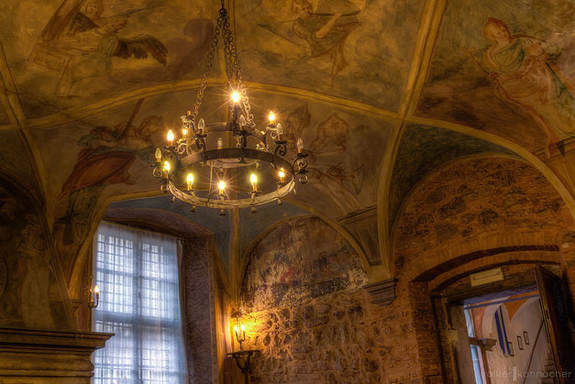It was on our second trip to Europe together in the 1970s that Mom and I discovered the Wilhelm Tell.
Instead of the grand old hotels we had stayed in on our Caravan tour the previous year, we were staying in cheap places that were just a step above pensions – all humble but clean, all featuring a bathroom down the hall that we shared with other guests. The name of our Munich hotel is lost to history – and here I never thought I’d forget these details – but it had the typical stucco exterior, painted a pale salmon pink, and our room was stark white and very austere.
The Wilhelm Tell was a tavern just down the street and around the corner from our hotel. It was dark and smelled of beer and cigarettes and a roast in the oven and we loved it. Although we really weren’t all that fond of German food generally, we ate lavishly here, feasting on pan-fried pork chops and carrot salad with a vinaigrette dressing and quite possibly the best French fries in the world. (The Germans really know their way around a potato.) And it was cheap to boot, especially for Americans in those days of favorable exchange rates.
This was no tourist spot; the neighborhood was pretty far from Munich’s major attractions. It was noisy and not exactly spotless, but the waiters were friendly and smiled encouragingly as we spoke in broken German (delivered with a Polish accent, one insisted), making us feel like part of the crowd.
I think we stayed in Munich three nights on that trip, and ate all three of our dinners right there at the Wilhelm Tell. I suppose, in retrospect, that Mom might have been bored with that, or, for that matter, less than thrilled with our accommodations. After all, she had traveled through Europe extensively with my dad on his business trips, staying at luxurious hotels and dining at some of the finest restaurants. But if she was either, she never let on. In fact, she seemed to thrive on rubbing shoulders with the locals, laughing along with them as she explained in her floundering German that her husband had been in Deutschland geboren and that we had beloved freunden in Siegen.
My mother had her dreams of heaven, dreams that included the “strange and lovely” streets of Salzburg and a crisp October morning and a 10 a.m. glass of beer.
I have mine, too, and one of the best takes place in a dark little restaurant called the Wilhelm Tell.
(From Heaven Without Her, pages 244-246)

 RSS Feed
RSS Feed